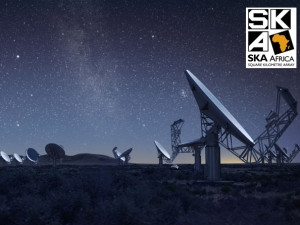Johannesburg, 03 Apr 2013

In the beginning
When three university friends - Anthony Robinson, Mark Gebhardt and Jasper Horrell - decided to start a technology company together, they never knew the fascinating journey it would take them on. Especially for one, who would become an integral member of the bid to host the world's largest radio telescope (the Square Kilometre Array) in South Africa, proving that South Africa has the skills to pull it off.
In the early days at UCT, the friends studied under Prof. Mike Inggs as part of the Radar Remote Sensing Group. Robinson's MSc was in artificial intelligence applications to radar target recognition and Horrell's was on Synthetic Aperture Radar. Gebhardt went on to work in the UK to develop software for rockets.
The three later reconnected and co-founded a software company that was to become Saratoga.
Jasper Horrell was directly involved with the early stages of the South African bid for the SKA, thanks to the support from his friends and colleagues.
Robinson, still CEO of Saratoga, says: "We encouraged Jasper to join, knowing it would impact the company. It was an incredible opportunity, and we wanted to be involved, even if only vicariously through Jasper. The SKA's data storage and processing needs are incredible. But it's worth remembering that the Apollo guidance computer was less advanced than some of today's toasters. The SKA will help refine technologies and enrich people's lives in ways that we can only imagine."
South Africa leads the way
The Square Kilometre Array is a global collaboration of 10+ countries (including South Africa) that is aimed at providing answers to fundamental questions about the origin and evolution of the universe. The initiative is scheduled to be in full operation sometime around 2025 and is expected to operate for 30 to 50 years.
The SKA will drive many global firsts in computing, technology, astronomy and physics. Even at this early stage, SKA is proving to be a catalyst for future growth and technology in South Africa. Horrell is now General Manager of Science Computing and Innovation of SKA South Africa, and he spoke to us about what is to come for the SKA.
As the largest radio telescope in the world, the dish component of the Square Kilometre Array will produce over one exabyte (one billion gigabytes) of data in a 24-hour period. To put this in perspective, it would take nearly two million years to play this data on an iPod - double that of global Internet traffic!
The dispersed radio telescopes are positioned to capture the radio frequencies emitted naturally through various mechanisms throughout the universe, such as pulsars, vast clouds of hydrogen surrounding galaxies, and matter spiralling into black holes. From this vast amount of data, interesting signals are sifted from the ambient noise in an effort to avoid having to send large quantities of data from one place to another. The storage capacity required is 10 times that of the Large Hadron Collider at CERN. Much of SKA's processing for the African component of the array is likely to take place near the SKA site, in the Karoo.
Over the next four years, experts from around the world will be working on the detailed design of the first phase of the project, due to start in 2016. The second phase is scheduled between 2019 and 2024. As a South African government-funded initiative, the influence of SKA can be felt at many levels: from the growth of high-tech business, to government (infrastructure improvements) and education (increased intake of science and technology students), through to grassroots level (local job creation and training around the maintenance of the telescopes).
SKA will be made available to a variety of groups, each with their own objectives in terms of the answers they're seeking - questions about the formation of the universe, dark matter, dark energy and even validating Einstein's theory of relativity.
Visit http://www.ska.ac.za/ for more information.
Sarah Meder
Saratoga Staff Writer
Share